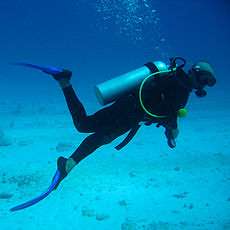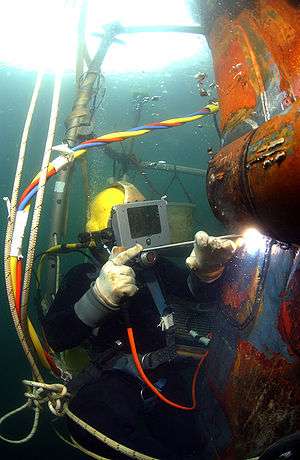Diving instructor

A diving instructor is a person who trains underwater divers. This includes free-divers, recreational divers including the subcategory technical divers, and professional divers which includes military, commercial, public safety and scientific divers.
Depending on the jurisdiction, there will generally be specific published codes of practice and guidelines for training, competence and registration of diving instructors, as they have a duty of care to their clients, and operate in an environment with intrinsic hazards which may be unfamiliar to the lay person.[1]
Recreational diving instructors are usually registered members of one or more recreational diver certification agencies.
Military diving instructors are generally members of the armed force for which they train personnel.
Commercial diving instructors may be required to register with national government appointed organisations,[2] but there may be other requirements in some parts of the world.
History
In 1953, Jack Atkinson, the first National Diving Officer of the British Sub-Aqua Club, and Colin McLeod started a system of training and accreditation for Third Class, Second Class and First Class Divers, which was based on the three-tier system with which they were familiar, as used for divers in the UK armed forces. This programme was developed over the next six years culminating in the first BSAC Diving Manual, published in 1959. Oscar Gugen, one of BSAC's founders, and George Brookes travelled the UK helping to set up branches of BSAC, all of which used amateur instructors to deliver the BSAC training programme within the club setting.[3]
In 1959, The YMCA developed the first nationally organised scuba diving course and certified their first skin and scuba diving instructors in the United States.[4][5]
Training and registration
A diving instructor is as a rule required to be qualified as a diver to at least the same level as the divers to be trained. Additional requirements vary.
Instructors of professional divers are generally required to be qualified as supervisors for the level of diver they can train, and may also be required to have some qualification in adult education as facilitators, assessors or moderators, and to be registered with a governing body. There is usually also a requirement for some experience in the industry before a diver can be trained as a supervisor, and similarly before a supervisor can become an instructor. The actual requirements vary depending on the jurisdiction.
Recreational diving instructors may be subject to significantly less stringent requirements. These are set by the certification agencies to which they are affiliated, and may also be specifically or generally regulated by health and safety legislation. In the UK the Diving at Work Regulations specifically include training of recreational divers, while in the US and South Africa, the professional diving regulations specifically exclude recreational diving instruction.[2][6]
Employment
Job satisfaction in the recreational diver training industry
In 1995, a study conducted on Queensland, Australia diving instructors showed that positive job satisfaction correlated with intention to remain in the dive industry and still active in their present job for the next 12 months.[7] The same study also showed that wages were still a primary concern since it was first noted by Kessler in 1976.[7][8]
See also
References
- ↑ Richardson, Drew (1996). "An assessment of risk for recreational dive instructors at work.". South Pacific Underwater Medicine Society Journal. 26 (2). Retrieved 2013-03-30.
- 1 2 Diving Regulations 2009 of the South African Occupational Health and Safety Act, 1993. Government notice R41, Government Gazette #32907 of 29 January 2010, Government Printer, Pretoria
- ↑ Rogerson, Simon (January 2013). "Birth of BSAC". SCUBA The Official Magazine of Britain's Biggest Diving Club. TRMG. Retrieved 4 April 2013.
- ↑ Staff. "History of YMCA Underwater Programme". Diving History.com. Retrieved 2013-04-05.
- ↑ Richardson, Drew (1999). "A brief history of recreational diving in the United States.". South Pacific Underwater Medicine Society Journal. 29 (3). Retrieved 2013-04-05.
- ↑ Statutory Instruments 1997 No. 2776, HEALTH AND SAFETY, The Diving at Work Regulations 1997. http://www.legislation.gov.uk/uksi/1997/2776/introduction/made
- 1 2 Wilks, J (1995). "Job satisfaction in Queensland scuba instructors.". South Pacific Underwater Medicine Society Journal. 25 (1). Retrieved 2013-03-30.
- ↑ Kessler JR (1976). "How much is a professional scuba instructor worth?". In: Fead L. Ed. Proceedings of the 8th International Conference on Underwater Education. NAUI: 163–170.
.jpg)

